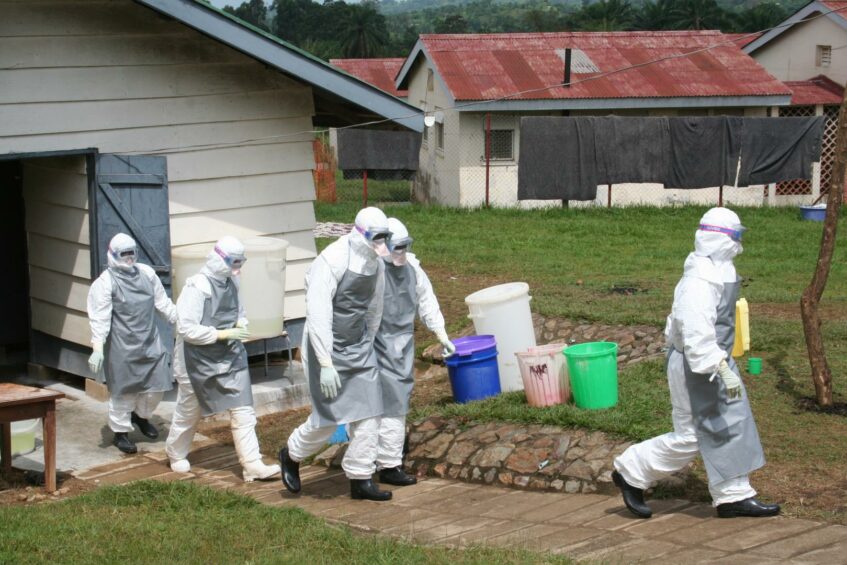
Health workers at an isolation centre in Uganda in 2017. (Photo by World Health Organization).
The Council of Ministers on Friday alocated 500,000 US dollars as funds for mitigation and prevention of Ebola following reported outbreak of the virus in Uganda early this week.
The budget was allocated during Friday’s cabinet meeting, as neighboring Uganda battles the fatal tropical disease that has killed 11 people as of September 24.
Addressing the press after the cabinet meeting, Minister of Cabinet Affairs Martin Elia Lomuro said the ministry of health has the facility and expertise to tackle the disease.
He said the ministry of health will deploy health works to monitor and check point with neighbor countries.
“The council consider the important of controlling the entering board to Uganda and DRC to control the Ebola, also the council make sure that South Sudan have the equipment and facilities and expertise to test and control the disease,” said Lomuro.
“We were told that ministry is in that passion and capable and it has the experts and machines. We have approved 500 thousand dollars for emergency control.”
Uganda on Tuesday declared an outbreak of Ebola after a case of the relatively rare Sudan strain was confirmed in Mubende district in the central part of the country.
The Uganda Virus Research Institute confirmed the case after testing a sample taken from a 24-year-old male.
What you should know about Ebola
Ebola is a viral haemorrhagic fever that was first discovered in the Democratic Republic of Congo (DR Congo).
Five of the virus species are known to cause disease in humans — Zaire, Sudan, Bundibugyo, Reston and Tai Forest.
The first three have resulted in serious outbreaks in Africa.
The virus’ natural reservoir animal is suspected to be a species of fruit bat, which does not itself fall ill but can pass the disease on to primates, including humans. Humans become exposed to the virus if they kill or butcher infected bats for food.
Among humans, the virus is passed on by contact with the blood, body fluids, secretions or organs of an infected or recently deceased person.
Those infected do not become contagious until symptoms appear. They become more and more contagious until just after their death, which poses great risks during funerals.
Death rates are high, at around 50 percent on average of those infected, and up to 90 percent for some epidemics, World Health Organization (WHO) data show.
Following an incubation period of between two and 21 days, Ebola develops into a high fever, weakness, intense muscle and joint pain, headaches and a sore throat.
The initial symptoms are often followed by vomiting and diarrhoea, skin eruptions, kidney and liver failure, and sometimes internal and external bleeding.
Merck’s Ervebo vaccine, the first Ebola jab approved by the US Food and Drug Administration (FDA) in December 2019, has been shown to be highly effective in protecting people from the Zaire strain.
US group Johnson & Johnson has also reported promising results against the Zaire strain of its two-dose Zabdeno vaccine, which has been authorised for use in the European Union.
In terms of treatment, the WHO in August recommended two life-saving medicines, Inmazeb and Ebanga, which were successfully trialled during Ebola outbreaks.
Support Eye Radio, the first independent radio broadcaster of news, information & entertainment in South Sudan.
Make a monthly or a one off contribution.
Copyright 2024. All rights reserved. Eye Radio is a product of Eye Media Limited.